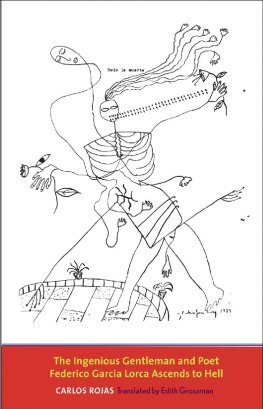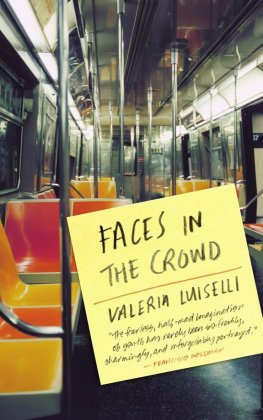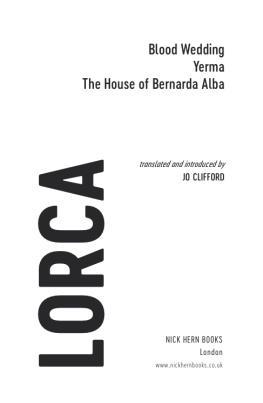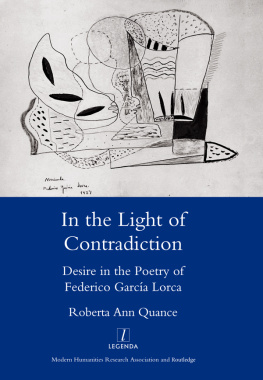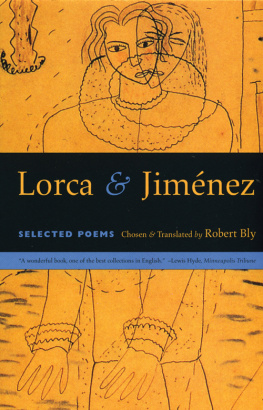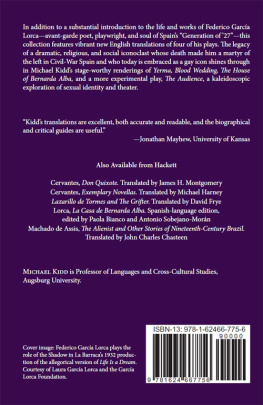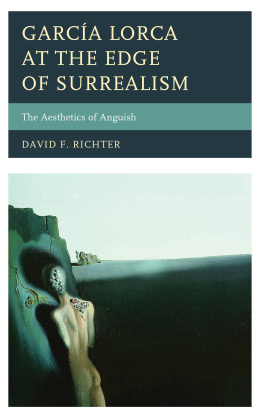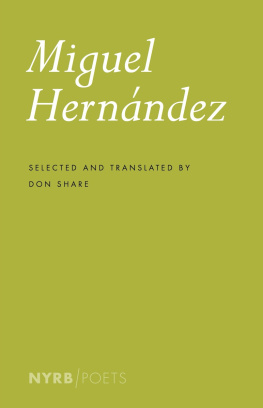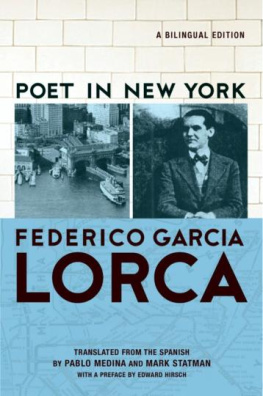Lorca After Life
Lorca After Life
Nol Valis

Published with assistance from the foundation established in memory of Henry Weldon Barnes of the Class of 1882, Yale College, and from the Frank M. Turner Publication Fund.
Copyright 2022 by Nol Valis.
All rights reserved.
This book may not be reproduced, in whole or in part, including illustrations, in any form (beyond that copying permitted by Sections 107 and 108 of the U.S. Copyright Law and except by reviewers for the public press), without written permission from the publishers.
Yale University Press books may be purchased in quantity for educational, business, or promotional use. For information, please email (U.K. office).
Set in Fournier MT type by Integrated Publishing Solutions, Grand Rapids, Michigan. Printed in the United States of America.
Library of Congress Control Number: 2021945450
ISBN 978-0-300-25786-1 (hardcover : alk. paper)
A catalogue record for this book is available from the British Library.
This paper meets the requirements of ANSI/NISO Z39.48-1992 (Permanence of Paper).
In memory of my sisters Judi and Kathleen, faithful to family
And the curious thing about the legend of a personality is that it may reach the highest fervor without being formulated. It is something by itself that stands behind anecdotes, death-notices, elegies.
John Dos Passos, Rosinante to the Road Again (1922)
Poetry cant be all that bad, when living politicians and the ruling class, with all the might of the State on their side, still have to contend with dead poets.
Jos Mara Pemn, Garca Lorca (1948)
I am as one disembodied, triumphant, dead.
Walt Whitman, So Long! Leaves of Grass (1860 ed.)
Contents
Acknowledgments
It is impossible to thank enough all the people who have helped and supported me over the many years I was thinking about, preparing, and finally writing this book. First, I owe boundless debts of gratitude to all the wonderful Lorca scholars, devoted enthusiasts of the poet. Then there are the many Yale students, undergraduate and graduate alike, who have patiently listened to me rehearse these arguments and tested me at the same time, who have shared with me the joy and torment of Federico Garca Lorcas poetry and plays. I have learned as well from the lively discussions with colleagues, who heard me give parts of the book, at the University of Northern Colorado, the University of CaliforniaLos Angeles, Yale University, Brigham Young University, Princeton University, Brown University, Louisiana State University, Swarthmore College, Temple University, West Virginia University, Dartmouth College, the University of North CarolinaChapel Hill, the University of Georgia, the Universidad de Len, and the Universidad de Crdoba. The list of colleagues, friends, and family to thank is doubtless incomplete: my daughter Maura Valis, my brother Greg and sisters Judi, Tina, and Kathleen, Wayne Valis, Ame Cividanes, Laurie Lomask, Wan Sonya Tang, Daniel Garca-Donoso, Eduardo Castro, Manuel Antonio Estvez, Joseph Pearce, Derek Gagen , Kevin Foster, Felipe Valencia, Adam Shellhorse, Evelyn Scaramella, Tanya Romero-Gonzlez, Nicole Mombell, Diego del Ro Arrillaga, Jos Antonio Simonet, Jos Ramn Sabn Lestayo, Luis Bautista Boned, Veronica Mayer, Sarah Glenski, Pura Fernndez, Francisco Vzquez Garca, Elizabeth Horan, James Whiston , Howard Bloch, Marilyn Wilkes, Dassie Weiner, Vctor Fernndez Puertas, Betsy Wright, Stacey Dolgin Casado, ngel Loureiro, Antonio Fernndez Insuela, Jim Mandrell, Curt Wasson, Maite Zubiaurre, Edgar Neville Guille, Jaime Manrique, James Valender, Juan A. Ros Carratal, Christopher Maurer, Susanne Zepp-Zwirner, George Esenwein, Jeff Zamostny, Jos Carlos Garca Rodrguez, Rosa Illn, and Laura Garca-Lorca de los Ros. I have benefited tremendously from the assistance given by the Interlibrary Loan staff of Yale University Library, the Beinecke Rare Book and Manuscript Library, the Biblioteca Nacional de Espaa, the Archivo Histrico Nacional, the Biblioteca de Andaluca, the Centro Federico Garca Lorca (Granada), and the Fundacin Federico Garca Lorca (Madrid).
Deeply missed are all the treasured conversations I had with my friend of over fifty years, Carol Maier, always thoughtful and subtle, who left us in 2020. Her comments more than once made me rethink this project. Dear to me also are Carolyn Richmond de Ayala and Rolena Adorno, whose steadfast support has never wavered. I especially want to thank my friend and colleague Roberto Gonzlez Echevarra, who in a moment of comic exasperation told me I should go write a book on Lorca, after we argued over who counted in the canon of great writers and who didnt, and whether we should pay attention to noncanonical ones. I didnt take him up on the suggestion right away, and I certainly didnt know at first what kind of a book I would end up writing. Over the years, I have worked on both kinds of writers, and this book is no exception, giving a role to a minor player, lvaro Retana, who, like his contemporary, the poet from Granada, was also a celebrity in his day. I would never have discovered Retana without Lorca, but I would never have written a book on fame and celebrity without Robertos challenge. Above all, its the force of nature, Lorca himself, who has driven this book forward. And now that its finished, I still cant let go of Federico. Readers of this book, I hope, wont either.
Early versions of parts of Lorca After Life first appeared as Lorcas Agona republicana and Its Aftermath, in Spains Agona republicana and Its Aftermath: Memories and Studies of the History, Culture, and Literature of the Spanish Civil War, edited, with an introduction, by Susana Bay Belenguer, Bulletin of Spanish Studies (ISSN 1475-3820) 91.12 (2014): 26794; Lorcas Grave, Yale Review 104.3 (2016): 4056; Celebrity, Sex, and Mass Readership: The Case of lvaro Retana, Kiosk Literature of Silver Age Spain: Modernity and Mass Culture, edited by Jeffrey Zamostny and Susan Larson (Bristol/Chicago: Intellect Books, 2017), 12751; Homosexuality on Display in 1920s Spain: The Hermaphrodite, Eccentricity, and lvaro Retana, Freakish Encounters: Constructions of the Freak in Hispanic Cultures, edited by Sara Muoz-Muriana and Analola Santana, Hispanic Issues On Line 20 (2018): 190216; and An Ordinary Life, First Things 301 (Mar. 2020): 2934.
I am grateful to the following people and presses for permission to quote from these texts: Edgar Neville Guille, for Edgar Neville Romres Su ltimo paisaje; Paloma Altolaguirre, for Manuel Altolaguirres A Saturnino Ruiz, obrero impresor; Helena Ruiz Fernndez and Jos Luis Romero Moragas, for Joaqun Romero-Murubes Romance del crimen; Javier Castroviejo and the Castroviejo family, for Jos Mara Castroviejos Paso firme and El ltimo hermano; The Crime Was in Granada, ANTONIO MACHADO: SELECTED POEMS, translated by Alan S. Trueblood, Cambridge, MA: Harvard University Press, Copyright 1982 by the President and Fellows of Harvard College; Second New York Poem and A Postface to The Lorca Variations, by Jerome Rothenberg, from THE LORCA VARIATIONS, copyright 1993 by Jerome Rothenberg. Reprinted by permission of New Directions Publishing Corp.; from Eminent Maricones by Jaime Manrique 1999 by the Board of Regents of the University of Wisconsin System. Reprinted by permission of the University of Wisconsin Press; from A Supermarket in California, in Collected Poems 19471997, by Allen Ginsberg Copyright 2006 by the Allen Ginsberg Trust. Used by permission of HarperCollins Publishers and Copyright Allen Ginsberg, 1956, 1961, used by permission of The Wylie Agency (UK) Limited; The Search for Lorcas Shadow, from THE MERCY: POEMS, by Philip Levine, copyright 1999 by Philip Levine. Used by permission of Alfred A. Knopf, an imprint of the Knopf Doubleday Publishing Group, a division of Penguin Random House LLC. All rights reserved.
Next page

